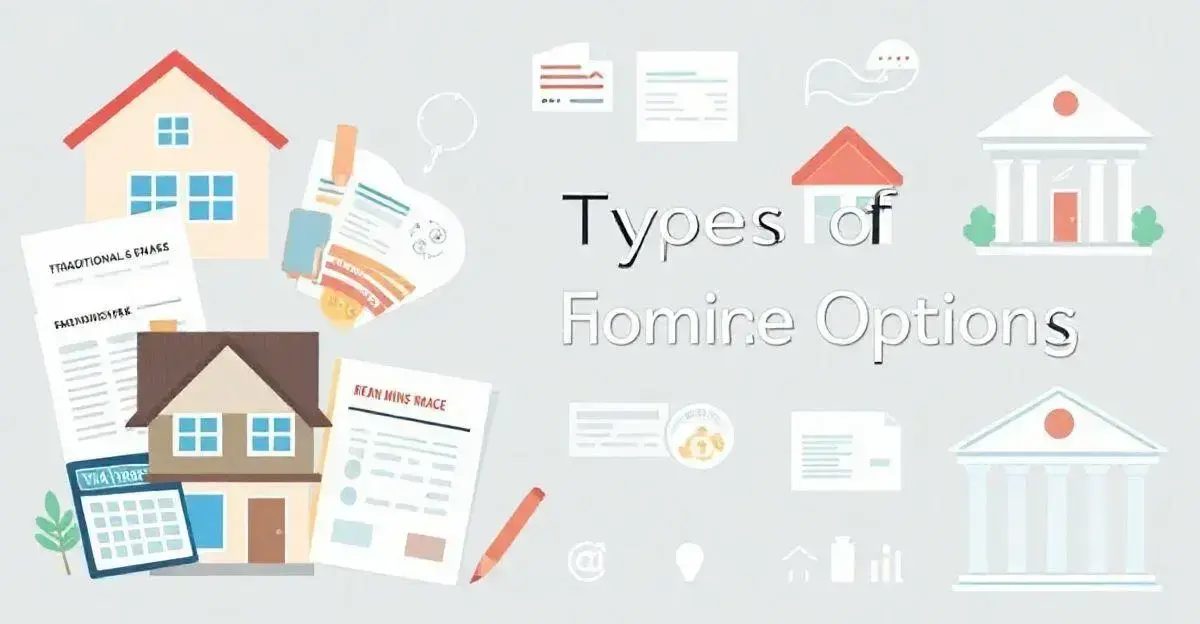Home financing is a crucial step for anyone looking to purchase a house in today’s market.
Understanding the various options available can greatly aid in making informed decisions.
Understanding Home Financing Basics
Understanding home financing basics is essential for anyone looking to buy a house.Home financing refers to the various ways you can borrow money to purchase a home. Most commonly, buyers seek mortgages, which are loans specifically designed for this purpose.
The lender agrees to provide the borrower with a certain amount of money, secured against the value of the home.
There are several different types of mortgages available, including fixed-rate and adjustable-rate options. A fixed-rate mortgage has a constant interest rate, meaning your monthly payment will stay the same over the life of the loan.
In contrast, an adjustable-rate mortgage may start with a lower rate but can fluctuate over time based on market conditions.
When considering home financing, it’s important to evaluate your personal financial situation, including your credit score, income, and existing debts. Many lenders have specific criteria for eligibility, and understanding these can help you secure the best possible terms for your loan.
By getting a firm grasp on the basics of home financing, you’ll be better equipped to navigate the home buying process confidently.
Types of Home Financing Options

There are several types of home financing options available for potential buyers. Each option has its own advantages and disadvantages, and understanding these can help you make an informed choice.
Conventional loans are the most common type; these are not backed by the government and usually require a down payment of around 20%. They can be a good choice for buyers with strong credit and financial stability.
Another option is FHA loans, which are backed by the Federal Housing Administration. These loans allow for lower credit scores and smaller down payments, making them accessible for first-time buyers. However, they come with additional insurance costs that can increase your monthly payments.
VA loans are available for veterans and active-duty military personnel. These loans are particularly advantageous as they often require no down payment and do not require private mortgage insurance, making homeownership more affordable for those who have served.
USDA loans are perfect for buyers looking to purchase homes in rural areas. Backed by the U.S. Department of Agriculture, these loans also allow for no down payment and are aimed at promoting homeownership in less populated locations.
Each of these options provides unique benefits, so it’s important to assess your financial situation and homeownership goals when deciding on a home financing method.
Benefits of Home Financing
Home financing offers numerous benefits for those looking to buy a house. First and foremost, it makes homeownership attainable for many individuals and families. With home loans, buyers can purchase a property without having to pay the full price upfront. This accessibility opens the door for first-time buyers and those with limited savings.
Another significant benefit of home financing is the potential for fixed monthly payments. With a fixed-rate mortgage, your payment remains the same throughout the loan term, making it easier to budget and plan your finances. This stability can be a major relief in an ever-changing economic landscape.
Additionally, home financing can provide tax advantages, such as the ability to deduct mortgage interest on your tax returns. This can effectively reduce your overall tax burden, making homeownership even more appealing.
Moreover, when you consistently make your mortgage payments, you are building equity in your home. Over time, this equity can be a valuable financial asset that can be accessed in the future through refinancing or home equity loans.
Altogether, the benefits of home financing not only make buying a home possible but also provide financial stability and growth opportunities for homeowners.
How to Improve Your Mortgage Eligibility

Improving your mortgage eligibility is an essential step for anyone looking to secure home financing. One of the most crucial factors is your credit score. A higher credit score typically leads to better mortgage offers and terms. To boost your score, pay your bills on time, reduce outstanding debts, and avoid opening new credit accounts before applying for a mortgage.
Another important factor is your debt-to-income ratio (DTI). Lenders prefer that your total monthly debt payments do not exceed 36% of your gross monthly income. To improve your DTI, consider paying down existing debts and ensure you have a steady income flow.
Having a stable employment history is also vital. Lenders look for consistent income over a period, often at least two years. If possible, avoid changing jobs close to your mortgage application, as stability can significantly increase your chances of approval.
Additionally, saving for a larger down payment can improve your chances. A down payment of 20% or more can reduce your monthly payment and eliminate private mortgage insurance (PMI), making you a more attractive candidate to lenders.
Lastly, consider working with a mortgage broker. They can help you understand your options and connect you with lenders who may be more forgiving of potential eligibility issues.
Common Home Financing Mistakes to Avoid
When it comes to home financing, there are several common mistakes that borrowers often make. Understanding these can help you navigate the mortgage process more effectively. One major mistake is not checking your credit report before applying for a mortgage.
Your credit history plays a crucial role in determining your eligibility and interest rates. Be sure to review your report and address any inaccuracies or outstanding issues beforehand.
Another common error is failing to consider all financing options. Many buyers jump straight into conventional mortgages without exploring alternatives like FHA loans or VA loans. Researching various types of loans can often lead to better rates and terms for your situation.
Many also underestimate the importance of the down payment. While a lower down payment might seem attractive, it typically results in higher monthly payments and may require private mortgage insurance (PMI). Aim to save for at least 20% if possible to minimise these additional costs.
Finally, don’t rush into a decision simply to get a mortgage quickly. This can lead to discovering hidden fees and unfavorable terms later on. Always shop around for the best deals, and compare offers from multiple lenders to make an informed choice.
Exploring Government Home Financing Programs

Government home financing programs aim to make homeownership achievable for a broader range of individuals and families. These programs are particularly beneficial for first-time buyers and those with lower incomes, providing greater access to affordable housing options.
One popular program is the FHA loan, backed by the Federal Housing Administration. FHA loans are designed to accommodate lower credit scores and smaller down payments, making homeownership more attainable for buyers who might struggle to qualify for traditional financing.
Another significant option is the VA loan, available to eligible veterans and active-duty military personnel. VA loans offer appealing benefits, such as no down payment and no private mortgage insurance, helping veterans secure a home without high upfront costs.
For those in rural areas, the USDA loan offers a valuable alternative. Supported by the U.S. Department of Agriculture, these loans also require no down payment and are intended to encourage homeownership in less populated regions.
These government-backed programs not only provide affordable financing solutions but also help promote stability in the housing market. By exploring these options, potential buyers can reduce financial barriers and move closer to achieving homeownership.
The Role of Credit Scores in Home Financing
Your credit score plays a vital role in securing home financing. It is a numerical representation of your creditworthiness, ranging from 300 to 850. A higher credit score indicates to lenders that you are a responsible borrower, which can lead to better loan terms and lower interest rates.
Generally, a score above 620 is considered acceptable for conventional loans, while scores of 580 or higher may qualify you for an FHA loan.
It is important to regularly check your credit report for errors or discrepancies. Mistakes can negatively impact your score and reduce your chances of mortgage approval. If you find inaccuracies, be sure to dispute them with the credit reporting agency.
To improve your credit score, focus on paying bills on time and keeping credit card balances low. Ideally, you should maintain a utilization ratio of less than 30%. Avoid taking on new debts before applying for a mortgage, as this can hurt your credit score.
Your credit history, including the length of time you’ve had credit accounts and your payment history, also affects your score. Establishing a solid credit history well in advance of applying for a mortgage can enhance your chances of approval.
Tips for First-Time Home Buyers

Buying your first home can be both exciting and daunting. As a first-time homebuyer, it’s essential to be well-prepared to ensure a smooth process.
Start by understanding your budget. Assess your finances and determine how much you can afford for a down payment and monthly mortgage payments. Don’t forget to factor in other costs like property taxes, insurance, and maintenance.
Next, consider getting pre-approved for a mortgage. This shows sellers that you are a serious buyer and have the financial backing to make a purchase. Also, it gives you a clear idea of your budget. Shop around for the best mortgage rates and terms to find the best fit for your financial situation.
Additionally, work with a qualified real estate agent who understands the local market. They can guide you through the buying process, help with negotiations, and ensure that you find a home that fits your needs.
Don’t forget to get a thorough home inspection before closing the deal. This can save you from unexpected repairs in the future.
Lastly, be patient, as finding the right home might take time, but it is worth the effort.
Empowering Your Path to Homeownership: Essential Tips for Success
Home financing is a complex process, but understanding the key elements can make it much easier.
From recognising the importance of your credit score to exploring government assistance programs, each aspect plays a significant role in achieving homeownership.
By learning about various financing options and avoiding common mistakes, first-time buyers can confidently navigate the market.
Remember to seek advice from professionals and stay informed about your financial standing.
As you prepare to make such an important investment, equip yourself with knowledge and strategies to ensure a successful purchase.
Homeownership is not just a dream; with the right approach, it can become your reality.
